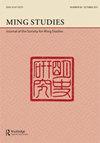Interviews with Scholars of the Ming: Questions for Professor Chün-Fang Yü
IF 0.3
0 ASIAN STUDIES
引用次数: 0
Abstract
It is easy to answerwhy I decided to studyBuddhismof theMingperiod.Mydissertation was on the Ming Buddhist monk, Yunqi Zhuhong 雲棲祩宏 (1535–1615). This topic was suggested by my dissertation advisor, Wm. Theodore de Bary. During the decade when I was a graduate student at Columbia (1961–71), most of my cohorts wrote dissertations on Ming Neo-Confucians. Although I took several courses with de Bary and Wing-tsit Chan, I was primarily interested in Buddhism. But Buddhism after Tang was an unexplored field in those days. It was rarely mentioned in the courses I took on Chinese Buddhism or the books I read. I did not know anything about Ming Buddhism and would not have chosen it as the topic of my dissertation. For this reason, I have always been grateful to Professor de Bary for pointing me in this direction. My interest in Buddhism and religion in general did not begin at Columbia. Rather, it began long before I came to America as a graduate student. Both my family background and my undergraduate education played important roles. My maternal grandmother was a pious Buddhist and a devotee of Guanyin. She lived with us until her death while I was in college. She was the one who first introduced me to vegetarianism, beliefs of karma and rebirth, daily chanting of theGreat Compassion Dharani, and the legend of Princess Miaoshan. I was among the first graduating class (1959) of Tunghai University in Taiwan. Although I majored in English literature, I took all the courses offered by Xu Fuguan徐復觀 (1903–82) and Mou Zongsan 牟宗三 (1909–95), two leading scholars of Chinese philosophy and intellectual history. I was particularly impressed by the thought of Laozi, Zhuangzi, and the thinkers of the Dark Learning. In my senior year at Tunghai, I applied to Smith College and Mount Holyoke College for admission to further study English literature. I was fortunate to be admitted to both colleges with full scholarships. I chose Smith because Miss Anne Cochran, the Chair of the English Department and my teacher at Tunghai, graduated from Smith. My ability to read critically and write research papers in English improved while at Smith. A course on “American Transcendentalism” about Emerson, Thoreau, and other thinkers made me recall the classes I took on Laozi. I applied to the PhD program in Comparative Literature at Yale and UC Berkeley after I received the MA. I was admitted to both. However, before I could make the decision, a chance to work as a TA for a summer session course of intensive Ming Studies, 83, 60–66, May 2021明代学者访谈录——方教授的问题
很容易回答为什么我决定学习明代的佛教。我的论文是关于明代高僧云祈朱鸿的雲棲祩宏 (1535–1615)。这个题目是我的论文导师Wm提出的。西奥多·德·巴里。在我在哥伦比亚大学读研究生的十年里(1961–71),我的大部分同事都写了关于明代新儒家的论文。虽然我和德巴里和陈荣灿一起上过几门课,但我主要对佛教感兴趣。但唐以后的佛教在当时是一个未经探索的领域。在我学习的中国佛教课程或我读的书中很少提到它。我对明代佛教一无所知,也不会选择它作为我论文的主题。因此,我一直感谢德巴里教授为我指明了这一方向。我对佛教和宗教的兴趣并不是从哥伦比亚开始的。相反,它早在我作为研究生来到美国之前就开始了。我的家庭背景和我的本科教育都发挥了重要作用。我的外祖母是一位虔诚的佛教徒,也是观音的信徒。我上大学时,她一直和我们住在一起,直到去世。她是第一个向我介绍素食主义、因果报应和重生的信仰、大悲大悲的日常吟唱和妙善公主的传说的人。我是台湾东海大学第一届毕业生(1959年)。虽然我的专业是英国文学,但我选修了徐复观开设的所有课程徐復觀 (1903-82)与牟宗三牟宗三 (1909-95),两位中国哲学和思想史的领军学者。老子、庄子和玄学思想家的思想给我留下了特别深刻的印象。在东海读大四的时候,我向史密斯学院和荷里约克山学院申请继续学习英国文学。我很幸运能以全额奖学金的成绩被这两所大学录取。我之所以选择史密斯,是因为我在东海的老师、英语系主任Anne Cochran小姐毕业于史密斯。在史密斯工作期间,我用英语批判性阅读和撰写研究论文的能力有所提高。一门关于爱默生、梭罗和其他思想家的“美国超验主义”课程让我回忆起我上过的关于老子的课。获得文学硕士学位后,我申请了耶鲁大学和加州大学伯克利分校的比较文学博士学位。然而,在我做出决定之前,我有机会在2021年5月83日、60日至66日的暑期强化明学课程中担任助教
本文章由计算机程序翻译,如有差异,请以英文原文为准。
求助全文
约1分钟内获得全文
求助全文

 求助内容:
求助内容: 应助结果提醒方式:
应助结果提醒方式:


